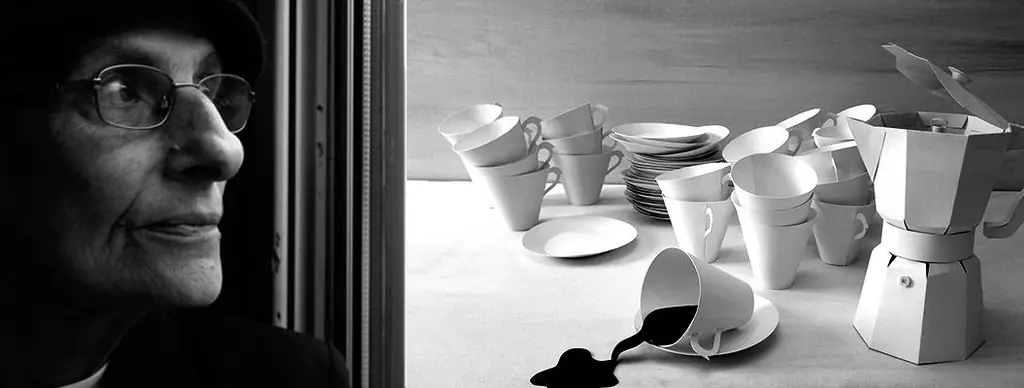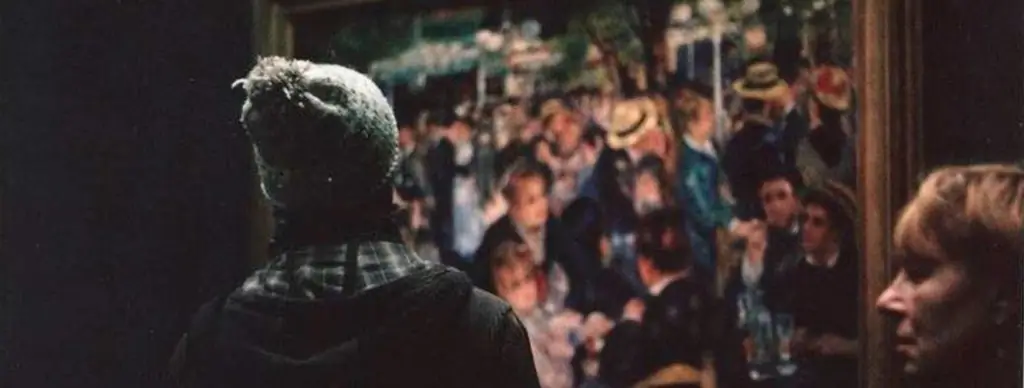- Author Adrian Jeff [email protected].
- Public 2023-12-17 05:06.
- Last modified 2025-01-24 14:09.

Senile dementia: what to do for relatives
Senile dementia, or senile dementia. The network has repeatedly described the signs of senile dementia, causes and recommendations for patient care. Even how to treat senile dementia. At the same time, the question remains - what should relatives do …
According to the WHO, there are about 50 million people with dementia worldwide. About 10 million new cases of the disease are detected each year. It is estimated that the proportion of the general population aged 60 and over with dementia at any one time is 5-8 for every 100 people. The total number of people with dementia is projected to be around 82 million in 2030, and 152 million by 2050. (Source
With the increase in the life span, the cases of this disease also became more frequent. Senile dementia, or senile dementia. The network has repeatedly described the signs of senile dementia, causes and recommendations for patient care. Even how to treat senile dementia. At the same time, the question remains - what should the relatives do.
Forums, where relatives share their observations, support each other, help a lot. But all agree on one thing - the patient is unpredictable, it is worth leaving him for a day, and you do not know what kind of destruction you will find in the apartment.
Senile dementia: personal experience
I had to move in with my dad to be able to control his condition. I have no medical education. I'm just a daughter. Therefore, there will be not medical advice, but recommendations on how to preserve love for a relative who is losing human form, and not to destroy their own health in worries. And since it is unlikely that I would have been able to maintain a positive attitude without knowledge of the training by Yuri Burlan "System-vector psychology" - we will understand it systematically.
So. You have noticed long ago that your loved one forgets everything and does not behave quite adequately. But after all, many in old age become capricious - so it is commonly believed - character deteriorates. As a rule, everyone himself understands that the mind is already failing: words and yesterday's events are forgotten. Try to agree in advance how you will coexist. The person himself will forget, but you will remain confident that you are doing everything right and do not contradict his desires.
Senile dementia is always a difficult choice for relatives. Do not rely too much on the help of a nurse. First, not everyone can afford this luxury. Secondly, the patient still needs to communicate with a relative. He needs emotional support more than meets the eye. Even if he is aggressive and forgot your name. Whatever the doctors promise, the course of the disease and your peace of mind largely depend on the emotional connection with him.
Take care of your own health in advance. Your psychological state, your stress resistance and mutual support of all family members are the key to maintaining the inner most comfortable state, without which you cannot help a patient with senile dementia, and, God forbid, you yourself will find yourself in a hospital bed. So we will definitely touch on the issue of personal psychological safety.
Development of senile dementia
When a child is born, his behavior is touching. At first he behaves like a small wild animal. It would never occur to anyone to demand from him skills that he has not yet learned. Gradually, he learns, adapts in society, and cultural restrictions are developed.
In the case of old age, the process is reversed. And not at all touching. Everyone understands that things are going to decline. And the mature age of a grandfather suffering from dementia is not at all a reason to demand the skills that he has lost. Yes, this fact is difficult to accept. But it is this understanding that will relieve those living nearby from false expectations and unnecessary irritation.
Another important point. As a child develops, he gradually discovers a new reality around him. First - only the mother, then - other relatives, the same kids on the playground … An adult already lives in a huge world. Senile dementia, with confident and clearly noticeable jerks, takes its ward out of the world, narrows reality, breaks ties. Already his whole world - one apartment and a couple of relatives. Or maybe not.
For example, even a few months ago my dad kept his memories of the blockade, evacuation, his work … These stories arose in his memory in response to the events of the outside world. Now he focused only on himself. It does not occur to him that there is someone else nearby. This is especially noticeable when we eat. My more active manifestation in his routine can even cause aggression.
I see how the world disappears in his perception. Painfully? It hurts me to watch. And he is fine, he is sure that he is doing everything right. It is difficult only in periods of short enlightenments to understand one's own powerlessness in front of the inexorably approaching end of life - and the psyche defends itself, leading it into an illusion.

Senile dementia prognosis: what to expect from the patient
Experts talk about the unpredictable behavior of people with dementia. This increases stress on those around you. Indeed, when you don’t know what to expect the next moment, the ground disappears from under your feet. Understanding the properties of my father's psyche helped me in perceiving the situation. In terms of system-vector psychology - vectors.
Any person in any situation and in any state exhibits only those properties of the psyche that are given to him by nature. No more. When consciousness is turned off, nature takes its full course. Everything is more predictable than it seems!
If the grandmother or grandfather does not have a skin vector, there will be no pathological economy. There will be no attempt, for example, to dry disposable sheets. A person without a skin vector would not think of this.
But what should relatives do when senile dementia occurs in a person with a large stock of knowledge and skills? Problems are reaching a more dangerous level. For example, my dad tries to repair sockets, cuts wires from appliances that seem broken to him. Trying to build some kind of gadget. The logic of his engineering thought can be traced very clearly, the desire is basically true. The implementation suffers.
Although it should be noted, the level of intellectual development strongly influences the course of the disease. The connection with reality remains longer, if initially the brain is more active, more neural connections are developed. In an active state, this increases the variability of decisions, and in adulthood, signs of senile dementia do not appear longer.
The owner of the anal vector, with a good development of properties, is a perfectionist and neat, and in a difficult state he likes to breed food mud. For example: first he brings his food to perfection, carefully cuts out the smallest dots on apples, chooses "defective" grains in porridge … and then all this turns out to be scattered on the table.
The visual vector, falling into an archetypal state, pulls out all fears. And the most important thing is the fear of death. It is here that the presence of relatives nearby is especially important. Emotional support has a positive effect on the patient's condition, soothes. Yes, he literally needs to be told a good bedtime story.
Senile dementia patients: a view from another world
It is very important to understand what the patient is experiencing. At the very least, so as not to aggravate the condition. We have already said that this reality is gradually leaving his perception, but desires remain. Despite senile dementia, the patient will try with all his might to realize his nature. And if it has several vectors, you will see their manifestations in all their glory.
The owner of the skin vector may seek to control everything. Especially if he is a former leader. There is no need to completely deprive him of this opportunity. This is in addition to the total savings and hoarding already mentioned. Show patience, you will still have time to throw away a bag of unnecessary rags or a piece of iron - do not do this in the presence of the patient. For him, these are real values that give a sense of security and safety.
For a person with an anal vector, home is important. The woman is the mistress, and the man is the owner of the house, this is his territory, his fortress. This fortress is strong for its constancy and measured way of life. Try not to rearrange furniture, do not outweigh things without urgent need. The world of a person with an anal vector rests on the immutability of the structure - the environment. Familiar things are reminiscent of the past. He is alive as long as the past holds him. The new is likely to remain outside his reality. The second thing that can keep his consciousness is family ties, although these threads are gradually becoming thinner.
In addition, patients with senile dementia with an anal vector, at least partially understanding what is happening, may experience a strong sense of guilt towards their relatives for their condition. After all, they will no longer be able to "repay the debt", to repay their care.
Men with an anal vector suffer especially from the loss of their masculinity. The one whose role is to be the head and protector for the whole family, it is very difficult to experience the loss of this status. "Men must endure hardships!" And then they change his clothes, like a little one, scold him for wet sheets and scattered things. Shame! And disgrace for him is unbearable. Try not to show a negative attitude towards his actions, because in his perception he is right.
Senile dementia. How Relatives Can't Go Crazy
No matter how difficult it is for you, pay attention to your desires. Figure out what's most annoying. After finding out how senile dementia manifests itself and how long they live with such a diagnosis, it is better to prepare in advance for a long struggle.
If you have a skin vector, it means that you are also not averse to keeping everything under control. And this is difficult to do: even with a good understanding of what to expect, it is difficult to avoid some element of surprise. Let go of the tension, take the future cost of rebuilding and buying new things for granted. You will not be able to live for the other, let him end his life as a free person, not feel like in prison.

It is difficult for the owner of the skin vector to survive the loss of time. A person with dementia remembers words for a long time, for a long time formulates a thought - he does everything unbearably slowly. You will have to take this for granted. On the other hand, while he completes some simple task, you may well have time to make the bed, prepare the table for food, and much more. Most importantly, do not rush it. This will only slow down the process even more. Especially if the patient has an anal vector.
The anal vector also suffers from the forced fuss in healthy people. When a person with senile dementia is in the house - what to do, the number of worries increases and a measured life comes to an end. But the owners of the anal vector have a wonderful trait - caring and respect for their elders. Don't rush, don't try to make everything perfect. Just be as caring as only you can. Surround your relative with warmth and peace. Show gratitude for all the good things that have connected you in the past. And it's not so scary if something turns out to be unwashed or unprepared - intimacy is much more important!
Your visual vector may suffer from bad smells, lack of positive emotions, and fears. Inevitably, each person tries on the situation for himself. And the visual person - especially. But it is he who has the ability to love and compassion, relieving any suffering. Fill the last years of your loved one's life with joy and bright impressions. Make tea, sit at the table together. Or just sit next to me and share your good impressions of today.
I understand everything … But he pisses me off
The main problem is that by an effort of will it is impossible to force oneself either to "treat with understanding" or "to show love and compassion." Moreover, if a family member has been diagnosed with senile dementia, additional conflicts often arise between other relatives. It is exhausting and irritating.
We are all living people with our own problems. Everyone in the arsenal of problems has something from the traditional set, depending on the vectors available: resentment, negative scenarios, fears, depressive states. And if in prosperous periods of life they are not too burdensome, in times of stress they bloom in lush color. And caring for a patient with senile dementia is a serious and usually long-term stress.
Do not reduce your reality to the walls of the apartment. Be sure to chat with friends, cook delicious treats for the whole family, find time at least once a week for your favorite activities. Believe me, no patient wants to see sad, irritated or frightened people next to him. Even if he suffers from senile dementia, he does not remember yesterday and knows very few people.
Here, a good support will be the free online training by Yuri Burlan "System-vector psychology". You will be able to understand both your reactions and the behavior of all family members. So it will turn out to look at the situation soberly, bypassing the interpretation of your perception. By understanding the real causes of negative conditions, you will get rid of many of them. Your attitude to what is happening will change.
You will be surprised to find that patients with senile dementia know how to laugh, respond with pleasure to simple jokes and do not "deliberately lead you on". Moreover, your positive attitude greatly speeds up any complex procedures that require the patient's consent. Try to change the diaper to a physically still pretty strong guy who doesn't want it at all, and you will understand what I mean.
How to prevent burnout
Senile dementia progresses in a loved one, but what should relatives do when they experience burnout? This is doubly important to understand for super-emotional owners of the visual vector. Forced limitation of bright positive emotions creates a feeling of stopping life. The world becomes gray, it begins to seem that feelings are leaving with colors, indifference arises. And here it is already unknown who needs help more.

Even if the patient has a visual vector, the first thing that "turns off" for him is empathy. Therefore, do not hope that he will understand your feelings, appreciate your concern. All his emotions are focused on himself. If you constantly think about your fears, about missed holidays and not having a vacation, nothing good will come of it.
Compassion, shifting the focus of attention from yourself to another, you not only help the person with dementia, but you yourself get rid of fears. Not only he needs it - you need it. In addition, if you can properly build relationships during this period, after the inevitable departure of the patient, you will not be left with a black emptiness in your heart, but with bright sadness and good memories.
If you also have an anal vector, this will avoid the oppressive sense of guilt. Knowledge of system-vector psychology will help to choose the ideal approach to the patient, to predict his desires. So you will be one hundred percent sure that you did everything possible so that your loved one completes his journey with dignity. Already in the very early stages, you will understand what to do if senile dementia is inevitable.






